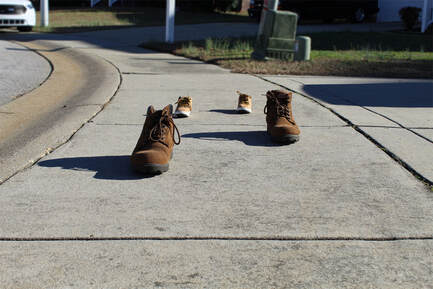 There's a lot of emphasis in our world today on being “social.” According to howmanyarethere.net, there are over 200 social networking websites/apps. Even the concept “to be social” is evolving. What I don’t think I’ve ever heard anyone talk about, though, is the truth that God Himself is very social. Here’s some of how we know this:
0 Comments
 Whether you've finalized your 2020 resolutions, don't have plans to make any, or are somewhere in between, the best place to start thinking about change in the New Year is with the Word of God. Before you start figuring out how to get out of debt or shed those holiday pounds (and those are wonderful goals!), start with the Bible, and with prayer, ask God to guide your priorities. Even within the 66 books of the Bible, you may wonder where to begin, so here are some suggestions.  Can you think of anything more humbling, perhaps more intimidating, than the reality that others are following us? There are times that I try to get my son Liam to copy me - words that I say, motions that I do, activities I perform. There are other times that he copies me without any encouragement - and as cute as this can be at times, it is a solid reminder that his little eyes are always watching. As I, in many ways, picked up so very much from my dad, so Liam will learn much from me. Will it be good? What kind of example am I setting for him? It really makes me think. The Apostle Paul had much to say about setting examples as leaders and exercising caution as to those whom we might follow. Specifically in 1 Corinthians 4:15-16, he writes, "For though you might have ten thousand instructors in Christ, yet you do not have many fathers; for in Christ Jesus I have begotten you through the gospel. Therefore, I urge you, imitate me." Paul distinguishes himself from others that may have been vying for the Corinthians' attention and allegiance as the one who led them to faith in Christ. As such, he invites them to follow him. Later on in the same letter (11:1), Paul says, "Imitate me, just as I also imitate Christ." Let this brief reminder that there are those following your lead - a humbling reality - drive you to a fresh commitment to remain locked in step with Jesus. May our steps as pastors lead every person following us along the straight and narrow path to pleasing and glorifying our Father in Heaven. To many people, teachings of a virgin birth, a star, angels appearing unto shepherds, and a Savior being born may sound odd. It would be like cracking open a book for the first time and starting to read in the middle. You don't know any of the characters, the setting, the purpose, the conflict; you just pick up in the middle of the story. This year, in my preaching and personal study, I've been setting the Christmas story in its larger Gospel narrative story. The Gospel narrative follows these major checkpoints: Creation, Fall, Redemption, and Restoration.
With Creation, we find the roots of Christmas. We find God's original plan - the Edenic perfection that God will one day restore. "In the beginning, God created the heavens and the earth." (Gen. 1:1) The Bible declares this. "All things were made through Him, and without Him nothing was made that was made." (John 1:3) This is a fact that we must accept by faith. Adopting a biblical worldview with God as Creator places Him in charge. He sets the rules. We are the created. We receive our existence from Him. The purpose of our existence is inseparably wrapped up in His will. "It is He who has made us, and not we ourselves." (Psalm 100:3) Our departure from this realization created the need for Christmas. I find it interesting that, as intelligent people, we ordinarily have no trouble inferring creative activity over against a hodgepodge of disorganized messes. For example, if I show you a fully wrapped gift that is placed under my Christmas tree, you naturally infer that someone wrapped the gift. If I place a tape dispenser, a pair of scissors, a roll of wrapping paper, and the gift on a table, how long would I need to wait for the gift to be wrapped? Years? Centuries? Millions of Years? Will it ever happen? Apart from the origins of the universe, we never apply the same assumptions about origins. And yet the universe is (obviously) far more complex than any of these other things that require agency to come together. Not to mention - wouldn't someone have to create the first matter from which all else evolved? The story of Christmas - of God sending His Son to be the Savior of fallen mankind - can never make complete sense to people who reject the idea of creation. God created the world. He created you and me. He loves us and desires fellowship with us. The events of Christmas occurred to move us along this overall trajectory - of bringing us full circle back to the perfection God had created.  Are you like most Bible readers who skim past the genealogies? Sometimes we call them "the begots." Here at Christmas, the genealogies of Jesus give us insights. Matthew 1:6, in tracing Jesus's legal lineage, makes this point: "David the king begot Solomon by her who had been the wife of Uriah." Those familiar with the Old Testament know the story well. Have you ever heard Jesus' family called "the holy family?" Go back a bit more, and you find that His ancestors weren't all that holy. David was king of Israel, and at a time when kings should have been at the battlefront, David was on the roof of his palace. He happened to see a woman named Bathsheba bathing, and in his lust over her, he committed adultery with her. Not only that, he also had her husband Uriah essentially executed by ordering him into a certain-death frontline situation. The sin would be found out, though, because Bathsheba became pregnant. That child perished, but a future child of the couple was named Solomon. This child became king and - get this - part of Messiah's lineage. We've heard Romans 8:28 many times. We have it on paperweights, greeting cards, bumper stickers, and more. What God did in the birth of Christ, though, is an example of His Romans 8:28 ability. God endorsed neither David's murder of Uriah, nor his adulterous union with Bathsheba. But He did work David's tragic mess together for good - to bring us Christ. The message is clear and powerful. "Where sin abounded, grace did much more abound." (Rom. 5:20). That's what Christmas is all about. God is so wise, magnificent and gracious that He took a situation as shattered and horrific as what we created through sin and brought out of it the spotless Lamb who takes away the sin of the world. Glory to God in the Highest! |
AuthorArchives
October 2020
Categories
All
|

 RSS Feed
RSS Feed